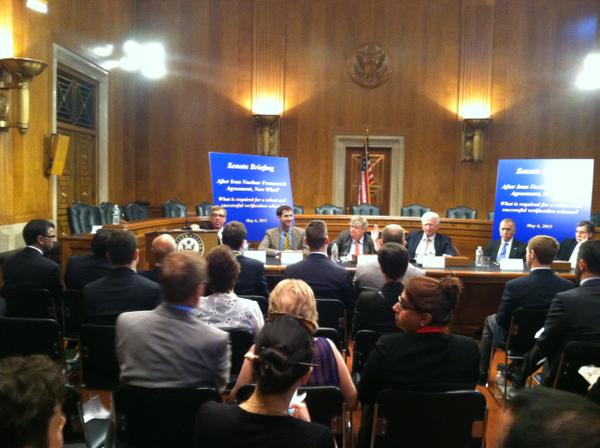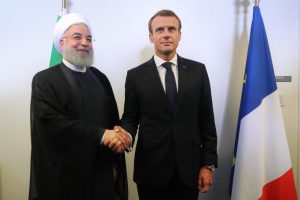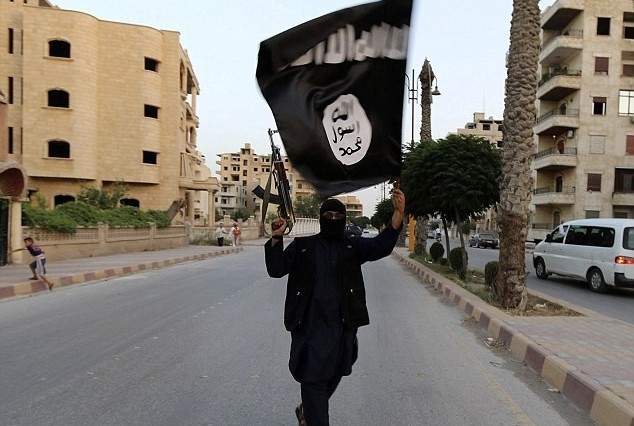by Eli Clifton
Freshman Sen. Tom Cotton (R-AR) garnered two profiles this week, one in The Wall Street Journal and another in The New York Times, highlighting his efforts to disrupt normal Senate procedure in hopes of adding “poison pill” amendments to the Corker-Cardin bill that, if passed, would give Congress a say in any comprehensive agreement reached between the P5+1 and Iran.
But in a Senate meeting room Wednesday, Cotton, seated alongside Sen. Thom Tillis (R-NC), may have outdone himself by joining a panel hosted by the Organization of Iranian American Communities (OIAC), a front group for the Mujahedeen-e-Khalq (MEK or MKO).
Cotton and Tillis were not alone. They were joined on the OIAC panel by former Ambassador to Morocco Marc Ginsberg, Senior Belfer Center fellow (and United Against Nuclear Iran advisory board member) Olli Heinonen, former Undersecretary of State for Arms Control and International Security Robert G. Joseph, and the former director of the National Counter Proliferation Center, Joseph R. DeTrani.
The MEK, which has worked hard – and spent a lot of money — to gain respectability in Washington since its armed units surrendered to U.S. forces in Iraq in 2003, is believed to have been responsible for the killing of six Americans in Iran between 1973 and 1976. Exiled following a power struggle in the early years of the Islamic Republic, the group fought alongside Saddam Hussein in the Iran-Iraq war. Following a lengthy lobbying and legal campaign that included the payment of substantial honoraria to prominent U.S. politicians and retired national-security officials, the MEK was removed from the State Department’s terrorism list in 2012.
The group, along with its numerous fronts in the U.S. and Europe, describes itself as Iran’s democratic government-in-exile but has little to no support within its homeland, according to independent Iran experts.
A 2005 report by Human Rights Watch detailed the group’s cult-like control over its members and a record of human rights violations designed to severely punish dissidents or would-be deserters.
But Cotton and the MEK share a common agenda when it comes to the nuclear negotiations with Iran. In a controversial video appearance from her Paris headquarters before the House Foreign Affairs subcommittee on counterterrorism last week, the group’s co-leader, Maryam Rajavi, recommended that the best way to defeat the Islamic State in Syria and Iraq was to pursue regime change in Iran. And, in January, Cotton, a protégé of Bill Kristol of the Emergency Committee for Israel, told an audience at the Heritage Foundation:
Certain voices call for congressional restraint urging Congress not to act now, lest Iran walk away from the negotiating table, undermining the fabled yet always absent moderates in Iran. But the end of these negotiations isn’t an unintended consequence of congressional action. It is very much an intended consequence — a feature, not a bug.
Neither Cotton nor the MEK, in other words, thinks there should be any negotiations with the Iranian government.
It appears that Cotton, who has quickly displaced Lindsey Graham as the Senate’s most hawkish member, has decided that it is necessary – perhaps even politically desirable – to make common cause with a group that has committed serious human rights abuses, allied itself for some two decades with Saddam Hussein, and carried out terrorist acts, including against U.S. citizens and servicemen – all in the interests of sabotaging an Iran nuclear agreement.
As Rajavi herself might say, “Quel enfant terrible.”






Reading Clifton’s piece, I am reminded of the old adage, “if you don’t like the message, shoot the messenger.” By regurgitating stale and repeatedly debunked allegations against the MEK, Clifton is in essence parroting Iran’s lobby inside the Beltway that the U.S. should appease Iran into abandoning its nuclear weapons program, its nefarious meddling in Iraq and its dreams of establishing a Shiite Caliphate. The problem is that the regime cannot backtrack, because as it supreme leader said, one step back would mean retreating until the Islamic Republic is overthrown. No one says negotiations are bad. The problem is how can you trust a regime that has been engaged in denial, duplicity and deception for 30 years? And one last thing, the Iranian regime has more blood of Americans on its hands than even Al Qaeda. That has not stopped the administration from sitting on the table with its officials. Does anyone see the hypocrisy of Clifton’s polemic?
I’m not sure what the big deal is about MEK. I mean everyone here seems to be supportive of negotiating with Iran which itself is the State Dept. terror sponsor list and was responsible for directly killing American personnel during the Iraq war through IEDs supplied by Iran. It’s the same thing with Cuba, a nation almost a poster child for terror and civil wars, but now on the verge of being a tourist attraction. We also let corporations engaged in terrible misdeeds that kill people and destroy the environment operate openly and engage paid lobbyists and make billions in campaign contributions. And yet, we’re going to town on the MEK and Tom Cotton for being cozy and making contributions? If that isn’t a double standard, I’m not sure what is. Heck, we even allow the PLO and Hamas to participate in lobbying efforts and we know the Israel lobby raises a stink about that. Funny how everyone seems to share the same approach when it comes to opposing people on the opposite side of their views.
Barbara’s got a point.
I think the real problem with supporting the People’s Mojahedin Organization of Iran (to give it its correct name–MEK? means suck! in Persian.) is not its terrorist past. It’s that it is overwhelmingly hated and despised by the Iranian people and has absolutely no support inside the country. This is made clearest by the 2009 demonstrations–not a shred of support to the Rajavi Cult, not even a single pro-Rajavi slogan daubed on a single wall. It is a bizarre totalitarian cult which collaborated with Saddam during and even after the brutal war with Iraq (I cannot post links here, but google Rajavi Saddam and go to “videos” and you’ll see what I mean). And yet it is given these pompous titles of “government in exile” and “leader of the opposition” by its lavishly-paid supporters!
So this cult represents nothing and nobody in Iran and recognizing and supporting it is a poke in the eye the Iranian government when you’re trying to negotiate with it, with absolutely nothing to show for it. At least when the US poked the Soviets in they eye even during the course of detente, it has some nominal strategic purpose. Supporting this ridiculous cult has no conceivable purpose.